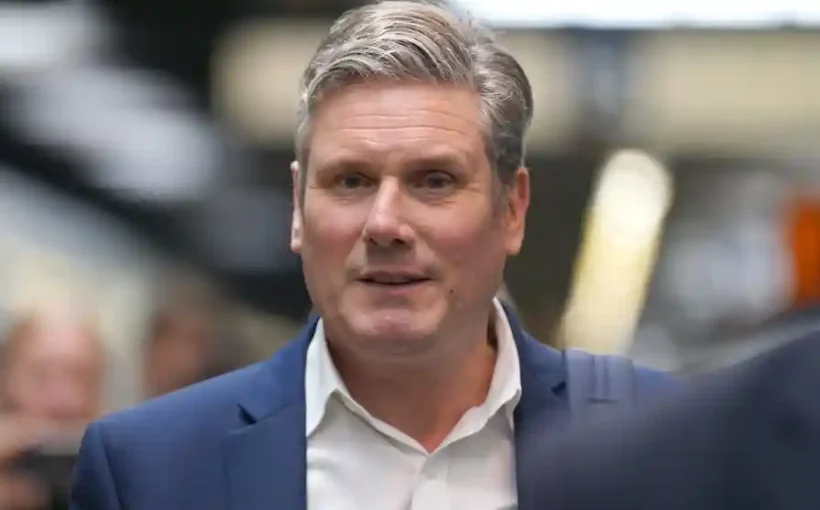Keir Starmer has pledged to resign should police fine him for breaking lockdown rules.
The Labour leader is under investigation for a gathering in Durham in April 2021, where he was pictured drinking a beer.
At the time, the ban on indoor mixing between households remained in place. But there was an exemption for “work purposes”.
Starmer has denied wrongdoing as he simply “stopped for something to eat” during the working day.
But if he does end up quitting, what happens next? To put it bluntly, Labour would need a new leader.
Labour leadership rules
If a Labour leader quits, a contest for their replacement is automatically triggered.
Under party rules passed at Labour’s last conference, candidates need the support of 20% of Labour MPs to get onto the ballot.
There are 199 Labour MPs, which means candidates need 39 to nominate them.
Starmer had initially proposed an even more radical change to the rules which included a 25% threshold of support from MPs.
But he was forced to water down his proposals amid opposition from the left and the unions.
Previously, including when Starmer was elected leader, candidates only needed 10% of MPs.
Raising the threshold was seen as a move by Starmer’s allies to lock leftwing MPs out of ever making it onto the ballot again in the wake of Jeremy Corbyn’s leadership.
As well as winning the support of 20% of MPs, candidates need to be nominated by at least 5% of Constituency Labour Parties (CLPs) or at least three affiliates (two of which must be trade unions).
Groups affiliated to Labour include the Labour Women’s Network, LGBT Labour and BAME Labour. Unions include the GMB, Unison and Unite.
For example, in the 2020 leadership contest, Starmer was nominated by the Usdaw and Unison unions and the affiliated environment campaign group Sera.
Candidates who make it onto the ballot then go to a vote of party members, on a one member one vote basis.
Under the rule changes agreed last year, members also now have to been signed up for six months to be allowed to vote in leadership contests.
The “registered supporters” scheme which allowed non-members to pay £25 to vote in the 2020 contest has also been axed.
In 2015, when Corbyn won the leadership, people could pay just £3 to have a vote.
The system was widely seen as handing Corbyn an advantage as non-members signed up in order to help him win the leadership.
Who are the candidates?
Lisa Nandy, the shadow levelling up secretary, is probably seen as the frontrunner in any contest.
Having run in 2020, she told The House magazine last year: “I don’t have any intention of ever putting myself through that again.” But on Sunday she refused to rule out throwing her hat into the ring if Starmer quit.
Angela Rayner, the party’s deputy leader, might also fancy a tilt at the leadership. She decided not to run in 2020 and instead run for deputy, she supported Starmer’s leftwing rival Rebecca Long-Bailey in the leadership contest.
But Rayner was also present at the Durham event and if she is fined for breaking the rules she has, like Starmer, pledged to quit, which would probably rule her out.
Wes Streeting, the shadow health secretary, is also a likely candidate. The 39-year-old has had a rapid rise under Starmer and is widely expected to run for leader one day.
Yvette Cooper, the shadow home secretary, ran for the leadership in 2015. She served in Gordon Brown’s cabinet as work and pensions secretary. In opposition she chaired the home affairs committee before returning to the frontbench under Starmer in November last year.
David Lammy, the shadow foreign secretary, is also a potential candidate. He has been the MP for Tottenham since 2000 and held several ministerial jobs during the Tony Blair and Gordon Brown governments.
Bridget Phillipson, the shadow education secretary, is talked of as a future leader. The 38-year-old has been MP for Houghton and Sunderland South since 2010 and her election as leader would mark a new generation.
Andy Burnham, the mayor of Manchester, has made no secret of his desire to be party leader one day. After losing to Corbyn in the 2015 contest, Burnham quit parliament to run for mayor. While he is popular in the party he is unlikely to be able to mount a challenge as candidates have to be MPs.
Sadiq Khan, the mayor of London, is also seen as keen to run for the leadership. But, like Burnham, is currently not an MP and barring a very convenient by-election in which he could stand, would be ineligible.
Source: Huff Post




